
 |
The doors opened, and two men entered the room. One was in his early fifties, with a greying beard and an expansive, larger-than-life air; the other was shorter and younger, dark and neat, with sharp eyes that missed nothing.
“Good morning, Gentlemen,” said the first, “and thank you for coming. I am Sir George Cavendish, and this,” he indicated the quiet man, “is James Horton.” Horton nodded, and quietly indicated the drinks cabinet in the corner in an enquiring way. Various of the guests expressed a preference, and Horton busied himself with quick, efficient movements preparing drinks.
"It's quite possible you chaps have heard of each other already, but I'd better introduce you to each other formally," Cavendish continued cheerfully, and went around the four people gathered.
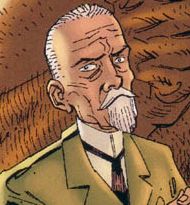 |
The first was a tall, rangy, tanned man with clear, watchful eyes and a calm competence, dressed in battered hunting clothes and swirling a deep glass with a little whiskey in it. A heavy holdall lay at his feet, bulging in that special way that only a big bag very full of guns could. "This is Allan Quartermain," said Cavendish, "a big-game hunter, trekker, prospector and who knows what else. An old Africa hand and an author; you may have read some of his books. In Africa, I'm told, the natives call him Macumazahn, meaning "Watcher-by-Night," or more loosely, “He-Who-Keeps-His-Eyes-Open”. He has hunted pretty much anything that can be hunted - until now." Quartermain nodded amiably at the other three.
 |
Next, Cavendish indicated a slender, soberly-dressed man of average height. He had the look of an intellectual, not an adventurer like Quartermain, but a close look at his eyes showed a man who had seen a lot - more than he'd like, perhaps - and been made more resilient by it. "John Smith," said Cavendish seriously, "is very probably the world's greatest living authority on the Martian invaders. The first cylinder landed within a mile of his home, and he witnessed nearly every aspect of their activities, right up to the very end. Some of you may be familiar with his account." Smith, who had taken neither drink nor tobacco, stood up and bowed slightly. "Good morning, gentlemen," he said quietly. He seemed not entirely sure if he was happy to be there.
 |
Cavendish moved on to the next man, a very tall dark-haired man with a very precise air and the eyes of a hawk, impeccably dressed and with a tweed deer-stalker hat on a small table next to his chair. He had already lit his pipe and his eyes glittered through the coils of smoke he was producing. "Anyone who reads the papers already knows who this gentleman is. Sherlock Holmes, greatest detective of the age, creator and master of the Art of Deduction. Less well-known is the work he and his sadly deceased associate Dr Watson performed during the Martian attack, smuggling people out from under the noses of the Martians." Cavendish chortled. "Not that they have noses, of course," he said. Holmes smiled thinly. "If anyone can understand the minds of the damned things, it will be Holmes," continued Cavendish expansively.
Finally, Cavendish turned to the fourth man, sitting at his ease in the uniform of a cavalry Major of the British Army and smoking a Havana cigar with evident relish. He had an aristocratic air as well as one of authority. "Major Churchill here has the distinction of being the most successful surviving commander to have engaged a Martian force and survived, as well as being a veteran of various campaigns across the Empire. His political ambitions have had to be put on hold, and his commission has been reactivated in order to add him to our little team." Churchill nodded to Cavendish with respect and a degree of familiarity; it seemed that he, alone of the four, had met Cavendish before.
Cavendish returned to the front of the room, and positioned himself where he could see all four of the men, accepting a glass of brandy from Horton with a curt nod. “We are representatives of His Majesty Edward VII’s government,” he began, but before he could get into full flow Holmes interrupted him. "Does His Majesty know you represent him?" he asked, archly. Cavendish was unruffled. "His government organize things on his behalf," he said easily, "and we are an agency of that government, entrusted with the task of investigating the artefacts left behind by our Martian Friends. In order to do this, we propose to create a group of those most knowledgeable and experienced in all things Martian, as well as some whose talents suit them for this exercise. Your reports and opinions will be added to those of our own specialists, with the intention of better preparing the Empire in case the blighters decide to have another crack at us.”
He smiled broadly. “For those of you in the services, you will be brevetted to a rank higher than your current and paid accordingly; the civilians will be retained at one and one half times their normal commercial rates." Quartermain, ever practical, nodded approvingly. "I need hardly say that this represents a wonderful opportunity to serve your King and Country and secure significant scientific advantages for the Empire – as is only proper, mmm?”
He looked around. "There are acommodations set aside here for you, and the facilities of this building are at your disposal. Make yourselves comfortable, and be ready first thing. We're going on a recovery tomorrow!"
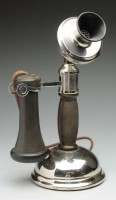 |
"Where?" asked Holmes curiously. "You'll see," replied Cavendish, and with a nod to each led Horton out, leaving the four together.
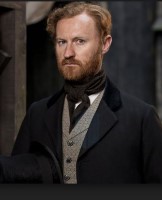 |
They fell to discussing the situation for a while, but came to no conclusions as there wasn't much to go on. After a while, Holmes excused himself and left the room. Outside, a little exploration of the main hall located the cubby with the house's telephone in it. Service on the phone had been very unpredictable since the war, but when he picked up the receiver a young voice responded immediately, "Yes, sir?" Holmes had the number in his notebook, though it was a long time since he had used it. "Whitehall 2158 please," he said quietly. A few moments later, a familiar voice came on the line. "Holmes."
"Good evening, Mycroft," said Holmes calmly. There was a pause.
"So, alive after all, dear brother," came the smooth voice of Mycroft Holmes. "It's been a while. How are things?" Holmes smiled slightly. "Interesting," he said honestly enough. "What do you know of a man called Sir George Cavendish?" Mycroft chuckled slightly. "Hmmn," he said, "has he recruited you for his little think-tank, then? Oh, he's the real thing, knight of the realm, government official, funding some of the investigation out of his own pocket I hear." Holmes nodded to himself. "Would you be interested in an ... exchange of information as we go along?" he asked. Mycroft chuckled again. "I'd be fascinated," he said dryly. "I need hardly ask you to be discreet?" "Hardly," responded Holmes equally dryly, and hung up.
The next morning, the investigators, Cavendish, Horton and a couple of scientists – introduced as Carslake and Wilson – boarded a special train which moved slowly out of London, heading south-west along the still ramshackle railways. After an hour or so, the train came into Woking station and the party disembarked. Smith chuckled wryly, and wasn't surprised when Cavendish led them north to Horsell Common. His own house was no more than a mile away.
Great swathes of the common were still blackened after the Martians' liberal use of the Heat-Ray, but trees and bushes were slowly returning to health. The centre of the common around the sand-pits was cordoned off by soldiers, but Cavendish was evidently expected and they were waved through. The vast shape of the Martian cylinder dominated the skyline as seen from the cordon and was clearly where they were going.
“All the other cylinders were looted by the curious, or smashed up by angry mobs; this one is stuck in the ground at a steeper angle, and we managed to get it under control before it could be ruined. We think this was the command cylinder, being the first to land, but I hope to prove that today.”
Around the cylinder was a fence enclosing the pit, in which was a small camp of scientists, soldiers and a workmen. Two Fighting Machines remained, one standing and the other fallen, rendered far less chilling by the scaffolding erected around them and their partial dismantlement. A Handling Machine stood nearby, seemingly ignored.
A ladder had been erected to the lip of the cylinder, and a small group of six soldiers were drawn up ready to accompany the party inside. Cavendish looked at Major Churchill. “Take charge of our escort please, Major,” he said cheerfully, “and lead on!”
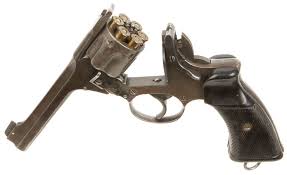 |
Quartermain eyed the ladders for a moment, then dumped his bag and rummaged inside for a moment, producing a heavy Webley .41 revolver. After checking the load he slipped it into a holster and buckled the belt around his waist. An ammunition pouch balanced the gun and he dropped some spare rounds into it. Holmes patted his coat pocket where he carried his own lighter pistol, while Churchill was carrying a standard-issue officer's pistol and a heavy cavalry sabre. Each soldier was armed with a lever-action rifle and a bayonet.
The group was quite large, all told; Cavendish and Horton, Carslake and Wilson the scientists, six soldiers and the four investigators. Perhaps typically, Churchill led the way up to the cylinder, the others following with a greater or lesser degree of balance.
D1 At the top, they found themselves in a huge cylindrical space, a "deck" occupying a slice across the width of the cylinder, a space around 20' high and thirty yards across. The top three feet of the rim was threaded on the inside surface, where the vast plug that closed the vessel had been screwed in. The exposed metal where it had been unscrewed had a peculiar blueish sheen, unlike anything any of them had seen before. The whole thing was tilted through thirty or so degrees due to the angle of the cylinder as a whole, but large rung-like grab handles, rather too big for a man's hands, dotted all the surfaces and evidently allowed the Martians to move around the cylinder whilst in space.
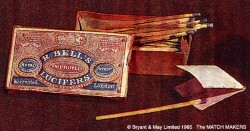 |
At the bottom of the "deck" were several closed circular doors, of an odd design and 8’ across, and one in the middle that was a full fifty feet - easily big enough for a fighting machine. Only one of the smaller ones was open. A quantity of muck and fallen leaves had gathered towards the lower edge of the "deck" but not much looked to have gone through the open "hatch".
Peering in, the expedition saw that the space beyond was illuminated with a somehow disquieting blueish light, perhaps rendering the heavy battery-powered electric lamps they had brought unnecessary. Oddly, the light seemed to emanate from nowhere in particular, rather to be of equal brightness everywhere in the space. Holmes struck a Lucifer and dropped it in; it tumbled down, struck the next "deck" down after around twenty feet, and tumbled down to the lower corner of the space before going out. A hint of curved walls and open space was visible, and no sign of anything immediately alarming. Cautiously, Churchill in the lead, the party swung themselves down into the next "deck" with the rungs.
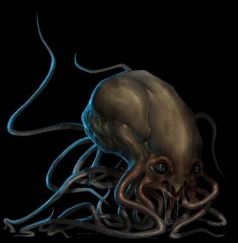 |
A big greyish rounded bulk, the size, perhaps, of a bear, [...] it glistened like wet leather. Two large dark-coloured eyes were regarding me steadfastly. The mass that framed them, the head of the thing, was rounded, and had, one might say, a face. There was a mouth under the eyes, the lipless brim of which quivered and panted, and dropped saliva. The whole creature heaved and pulsated convulsively. A lank tentacular appendage gripped the edge of the cylinder, another swayed in the air. Those who have never seen a living Martian can scarcely imagine the strange horror of its appearance. The peculiar V-shaped mouth with its pointed upper lip, the absence of brow ridges, the absence of a chin beneath the wedgelike lower lip, the incessant quivering of this mouth, the Gorgon groups of tentacles, the tumultuous breathing of the lungs in a strange atmosphere, the evident heaviness and painfulness of movement due to the greater gravitational energy of the earth-- above all, the extraordinary intensity of the immense eyes--were at once vital, intense, inhuman, crippled and monstrous. There was something fungoid in the oily brown skin, something in the clumsy deliberation of the tedious movements unspeakably nasty. Even at this first encounter, this first glimpse, I was overcome with disgust and dread. - from the memoirs of John Smith, Journalist |
D2 The second "deck" had internal walls, dividing it into four sections, though with a clear space in the centre around the large "hatch". The section into which the investigators had climbed was largely empty, except for two large huddled shapes resting against the bottom of the nearest "wall". From these, perhaps came the dreadful, unspeakable smell of rot and putrefaction which filled the air, sufficiently for Cavendish and Horton, as well as two of the soldiers to vomit miserably as they hung from the rungs.
This was Quartermain's first sight of a Martian, if only of an extremely dead one, and he eyed the corpses with interest. The eyes were long gone, and vermin and decay had damaged the things badly, but enough remained to show what they were like.
He prodded at the thick-looking hide of the nearest speculatively, then drew his revolver, took cautious aim, and fired. The echoing slam of the heavy pistol echoed backwards and forwards in the hollow, empty space, battering the nervous explorers with shock and alarm. Some of the soldiers cried out in alarm, while others raised their rifles in search of possible targets. Horton and Churchill were cooler, however, and settled the men down as they glared at Quartermain.
The hunter crouched, examining the mess with some satisfaction. "Not bullet-proof, then," he said, clearly reassured by this proof that - mighty though they were - the Martians could be slain by Earthly weapons. Cavendish glared at him. "I could have told you that," he growled. "It's a good job there's no-one in here to come looking what the noise was, isn't there?"
D3 The deck below, likewise quartered, was completely empty, but on the next four Handling Machines squatted on the deck, legs retracted, undamged and looking extremely threatening. Overcoming their fear, Holmes, Churchill and Quartermain went and examined the things closely. "Has any research been done on these? Do we know how they were powered?" Holmes asked Cavendish. "There's been some work, yes," replied the knight immediately. Holmes turned back to the Machine, considering. The answer had been very quick, as if it was something of which Cavendish was very aware; and it had invited no further discussion. Significant, he thought.
The three spent some time examining the machine, attempting to open the hood to gain access to the interior. Holmes, after some fumbling, found a concealed catch, and it popped open, showing a peculiar space within, at least twice the size of a Martian, with a cupped depression at the bottom in which presumably the Martian's roughly spherical body rested. Around it was ranged a bewildering array of flat black panels and tiny coloured chips of some material neither metal nor wood; some kind of controls and indicator dials.
Churchill climbed in, and sat awkwardly in the "seat", glancing around. Some of the controls were within his reach, but more than half were clearly designed for a being with an arm's reach over double his own. All were dark and unresponsive. Holmes and Quartermain, meanwhile, were fishing around in the back muttering about trying to "get into the power plant." Suddenly, Cavendisk and Carslake were peering in through the open hood. The scientist looked quite worried. "Leave this for now, gentlemen," said Cavendish sharply. "We have others to examine, and incautious experiments with these are quite dangerous. You might kill us all."
The explorers gathered and were just preparing to leave the "deck" when Quartermain narrowed his eyes. "What's that?" he said, pointing to the last Handling Machine in the line. Unlike the others, this one appeared to have something in the basket mounted on its' back, and the intruders went a little closer to investigate.
These canisters smashed on striking the ground--they did not explode--and incontinently disengaged an enormous volume of heavy, inky vapour, coiling and pouring upward in a huge and ebony cumulus cloud, a gaseous hill that sank and spread itself slowly over the surrounding country. And the touch of that vapour, the inhaling of its pungent wisps, was death to all that breathes. It was heavy, this vapour, heavier than the densest smoke, so that, after the first tumultuous uprush and outflow of its impact, it sank down through the air and poured over the ground in a manner rather liquid than gaseous, abandoning the hills, and streaming into the valleys and ditches and watercourses even as I have heard the carbonic-acid gas that pours from volcanic clefts is wont to do. And where it came upon water some chemical action occurred, and the surface would be instantly covered with a powdery scum that sank slowly and made way for more. The scum was absolutely insoluble, and it is a strange thing, seeing the instant effect of the gas, that one could drink without hurt the water from which it had been strained. The vapour did not diffuse as a true gas would do. It hung together in banks, flowing sluggishly down the slope of the land and driving reluctantly before the wind, and very slowly it combined with the mist and moisture of the air, and sank to the earth in the form of dust. - From the memoirs of John Smith, Journalist. |
In the basket were shadowy, crumpled shapes, which became visible as dead humans – men, women and children – twisted and racked in their final agonies, and coated in a strange, sooty black powder. Two more dead Martians lay nearby, one clutching a peculiar weapon like a very big flare-gun. As the explorers stared in horror and pity, Private Collins pointed a shaking finger. “They-they gassed ‘em!” he stammered. His rifle clattered as it fell to the deck. "They knew they was dyin', the barstards, an' they gassed 'em like they was insecks!" Suddenly he doubled over and heaved. Tears were running down Smith's face, and he was shaking visibly; it was some time before he could muster the strength to go on. While he recovered himself, Holmes took the weapon - clearly a dispenser for the dreaded Black Smoke - and placed it near the Handling Machine that he'd opened, ready to be taken with them when they returned. More than one set of eyes tracked him nervously, aware that if he slipped and discharged the thing, the whole party was as good as dead.
D4 The next "deck" down contained a number of Fighting Machines, likewise folded and quiescent, and the same catch Holmes had discovered allowed access to the interior. It revealed no more than had that of the Handling Machine, and the party left its' secrets for later.
D5 The next few "decks" were radically different, divided into a honeycomb maze of smaller rooms, each containing two large glass tanks filled with a thick, oily greenish-yellow fluid. Heavy, complicated-looking doors, like a submarine's hatch, gave entry to the tanks, and each had a small box fixed in the bottom corner, half through the glass, with more of the not-metal controls on and wires leading into the fluid.
Wilson the scientist took a careful sample of the fluid, and the investigators partially dismantled one of the boxes; not cautiously enough, though, as the resulting leak allowed the thick, heavy liquid to seep out and begin to spread across the floor. Holmes considered. "I believe," he said slowly, "that these tanks are how the invaders survived the incredible stresses of their flight and landing. Suspended in the fluid, they must have been cushioned from the impact and jolting."
Nobody wanted to remain where the stuff might touch them, and all were eager to move onwards.
D6 After several more "decks" of these tanks, the explorers reached a level filled with machine parts and inexplicable mechanisms, as well as several Fighting and Handling Machines in various stages of assembly. Cavendish and the scientists were delighted with this and started to settle down to spend some time making notes and sketches.
Quartermain, Holmes and Churchill decided to press on, taking four of the soldiers and leaving two of them with the scientists. Most of those remaining were engrossed in the discoveries of the assembly line - Cavendish's excalamtions of "Wonders!" could clearly be heard - but Horton's alert eyes watched them leave, though he didn't comment.
Descending, they found a level at first glance similar to that with the tanks - but horribly different.
D7 This "deck" was divided into a myriad of small cells, most closed, but three open. Before exploring further, the party examined the open hatch through which they had been descnding the cylinder. Quartermain looked for a switch matching the one on the Handling Machine, and there it was. Rather recklessly, he pressed it. There was a loud Thunk! as the hatchway sealed itself, the usual Martian mechanism of magentized plates in an elastic sheath slamming the disc of metal across the opening. Above and below they could hear an echo that was not an echo; Thunk-k-k-k-k - as all the other hatches above and below this one slammed as well. Frantically Quartermain tried to reverse what he'd done, but to no avail - Holmes had to intervene before the hatch could be opened again. From above came a querulous query as to "wot the 'ell you playin' at?" from one of the soldiers. Churchill glared up the hatchway, while privately considering that the man had a point...
Leaving Smith near the hatch with Private Jones, the others split up, each taking one of the rooms to examine.
Holmes and Churchill's were very similar; each contained the corpses of what at first appeared to be men of some strange kind, but were actually the Martians’ normal food – flimsy, skinny bipeds with sunken eyes in flinty sockets and flexible skeletons. Holmes gazed down at them. "Feeding rooms. I wonder if they were intelligent," he mused - then tensed at the sound of a muffled oath.
The third room - Quartermain's - contained the corpse of a Martian who appeared to have died actually feeding. Its’ tentacles were wrapped around the bloodless body of a human woman and, most horrible, a metal pipe piercing her jugular led to an orifice in the Martian's body... Quartermain had never seen the terrible truth of Martian nutrition before, and he was leaning against the frame of the doorway, eyes wide and breath rapid. Private Percy had staggered out of the room and was on his knees, eyes clamped tight shut, struggling for control.
 |
He was helped back to the open space near the hatch, and the group was preparing to descend once more when Smith stopped. "Did any of you hear that?" he asked. Everyone stopped to listen, and several picked it up this time - a distant skittering, somewhere below them. "Sounds like a rat's got in," said Holmes. "Yes. Yes, of course," said Smith dubiously, "it must be a rat..."
Holmes wanted to try to establish the possible intelligence of the Martians native bipeds, and so had returned to the one he found to seek clues. Carefully he went over the body, collecting clues, sketches, measurements and samples, but his abilities in the non-existent science of xeno-anthropology were insufficient for a conclusion, though he had enough to allow someone more qualified to do so.
D8 Descending once more, the investigators found a room unlike any other they had encountered. Unlike most of the others, it comprised an entire slice through the cylinder in one space. By rough reckoning, they concluded they were about in the middle of the cylinder. The room was lined with more peculiar cupped-table-like Martian seats, and banks of controls of the same design as the Handling Machine's. Lining the walls were strange, black “windows”. In front of one of the "seats", near the centre was a tulip-like holder, containing an egg-shaped piece of clear crystal, again of an alien hue.
As the party were considering this, the scuttering sounds came again .. this time from above them. Rats or not, this was unsettling, and Quartermain determined to get to the bottom of it. Drawing his revolver, he went back up through the hatch like a cat. After a moment's thought, Churchill followed him.
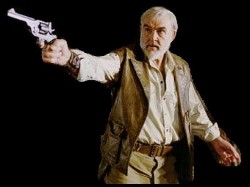 |
D7 Quartermain was acting on the pure instinct of the hunter, following occasional sounds, clues and hunches rather than any perceptible tracks. Rapidly, he bounded through the surreal, tilted structures of the feeding deck, slowly closing in on his prey. Judging its' track, he cut a corner and reached a T junction just as the thing approached it from a one of the other directions. Peering around the corner, he got his first look at his quarry.
Can you imagine a milking stool tilted and bowled violently along the ground? That was the impression [... it] gave. But instead of a milking stool imagine it a great body of machinery on a tripod stand. - From the memoirs of John Smith, Journalist. |
It was instantly obvious it wasn't any sort of an animal. In fact, it reminded him of something, and after a moment he realized what it was. It was not unlike a very, very small Fighting Machine - around waist-high - and with the same peculiar, precipitate movement he had read about. Sinuous tentacles writhed around it, one of them clutching a funnel-shaped object in a way that suggested it was a weapon.
Using the advantage of surprise, Quartermain levelled his heavy revolver, thumbed back the hammer, and fired. After his encounter with the corpse of a Martian, it was a bit of a shock when the .41 bullet spanged off the thing and bounced away down the corridor. Instantly, the thing pivoted, lifting and angling the weapon it held to point at Quartermain. As it did so, Churchill came running up, panting, having located Quartermain by the thunder of his shot. Lifting his own, lighter pistol, he too shot at the thing, and though his bullet was smaller it struck one of the legs, knocking the thing off-balance slightly as it released its' own attack. With a snap and crackle of breaking metal, the wall next to Quartermain's head blackened and split as it was instantly heated to near white-hot. A wave of heat lifted his hair and heated his face uncomfortably as he shot again. This time his round disappeared inside the thing's body. Or head. Or whatever it was!
Both fired again as the thing swivelled to recover its' aim, damaging it further, and it abruptly changed its' approach, spinning and attempting to flee. The damage to its' legs, however caused it to limp, and it moved far slower than it had been on approach. Two more bullets caught it in the back of the probable body, and abruptly it went limp, clattering and rattling down the corridor as if hurled, to come to rest in a heap.
 |
Churchill and Quartermain walked slowly down to it and looked down at it. A dark fluid, steaming slightly in the cool air, was leaking from it and pooling underneath. "What the devil was that?" said Churchill harshly. "No idea," replied Quartermain calmly, breaking his revolver and ejecting the empty cases. "I just shoot 'em. I'll leave it to Sherlock to figure that out." As Holmes, Smith and the four soldiers came jogging into sight, drawn by the gunfire, he slotted five fresh cartridges into place.
The new arrivals gathered around the wreck, eyeing it with disgust. "It's bloody bleeding," said Private Roberts, and prodded it with his bayonet. As he did so, a panel fell off, revealing the contents. Folded, greyish tissue, smeared in red blood where the bullets had pierced it. Holmes swallowed.
"It's a human brain..." he said quietly.
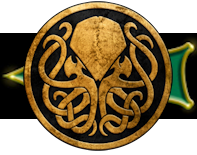 |
Session Date: 10th February 2015 |